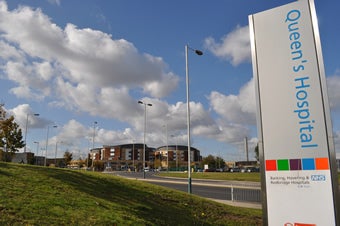Barking, Havering and Redbridge University Hospitals NHS Trust placed in special measures
A&E departments deemed unsafe because of the lack of full-time consultants

Casualty wards at an Essex NHS trust are “at times unsafe” because of a lack of doctors, the health watchdog has said, as another hospital group was put into special measures following an inspectors’ report.
The Barking, Havering and Redbridge University Hospitals NHS Trust is the fourteenth to be handed the sanction this year. The quality of care in some areas of the trust, in particular A&E, has raised concerns for years. Under the special measures regime an improvement director from another NHS trust will be brought in to oversee urgent improvements.
Barking runs two acute hospitals, Queen's Hospital and King George Hospital, both of which have A&E departments.
A CQC inspection report in October found that while the trust was working hard to make improvements in many areas, it still provided "unsafe care" in A&E and "needs to urgently focus" on resolving these issues.
The report said: "The A&E departments are at times unsafe because of the lack of full-time consultants and middle-grade doctors.
“There is an over-reliance on locum doctors with long waiting times for patients to be assessed and reassessed.”
The College of Emergency Medicine recommends that, for the number of patients seen in just one of the trust's A&E departments, it should have 16 consultants to provide cover 16 hours a day, seven days a week. However, the trust only had eight consultants in post, the CQC said. Heavy reliance on locum, or part-time, doctors, was “putting patients at risk of receiving suboptimal care”, they added.
The CQC did find examples of good practice, including impressive care provided to patients who had suffered a stroke.
Chief Inspector of Hospitals Professor Sir Mike Richards said: "This trust has demonstrated that it is capable of making significant changes to the quality of services.
"Maternity services have shown sustained improvement over time - and although the findings of last week's maternity survey suggest there may still be more to do, there has been progress.
"It is very disappointing that this good work has not been replicated throughout the trust. The long-standing issues in the two A&E departments are clearly affecting patients - and all attempts to address these problems over the last few years have had insufficient impact.
"While we understand that this trust serves a large and diverse population, and that the leadership team is trying to resolve the issues, it's clear to us the trust is unable to do so without help.
"That's why I've recommended that the trust should be placed in special measures in order to give it the support it needs to tackle the issues it faces."
Trust chief executive Averil Dongworth said: “There are three very important factors which we must not lose sight of today. First the CQC has recognised the good quality of patient care provided by our staff and sustained improvements to our services.
"Secondly, our patients need to know that it is business as usual. They can rest assured that our hospitals are performing well in many areas, services are continuing to improve and we are clear on where more effort must go.
"Thirdly, today’s decision provides the opportunity for the whole health system to come together to give our hospitals the level of support that we have been asking for. We must now all work together to address the long-term issues that we have been facing once and for all.”
Join our commenting forum
Join thought-provoking conversations, follow other Independent readers and see their replies
Comments
Bookmark popover
Removed from bookmarks